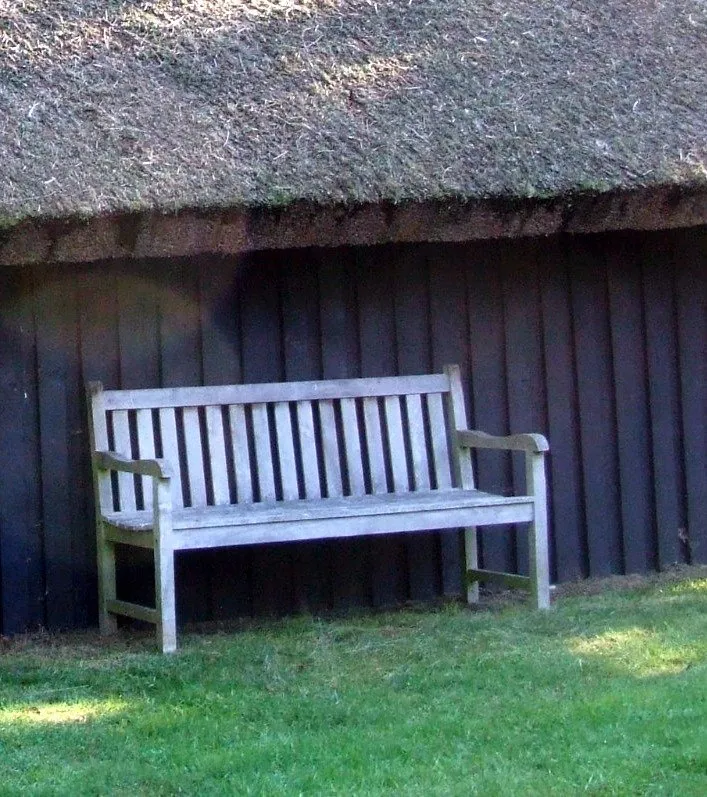I am an introvert.
I have always been one, and I know better that to expect that is ever going to change. After all, introversion is a basic character trait; a part of temperament... it's not something a person "chooses," it's something you simply are.
Our Loud, Bright and Very Shiny World

A peaceful bench...
We live in a loud, bright, outspoken, competitive, social, talkative and in-your-face world. For the most part, that is simply the way of the world. Statistics will back this up-- it's generally estimated that just one-third of the population is introverted, which two-thirds are extraverted.
What irks me is that there's this subtle subtext in our culture-- especially here in the US of A-- that introverts are somehow "defective."
Yes, I know. Nobody actually comes out and outright says that; but in spite of a growing number of books and articles on the topic, it's still there, hidden in the subtext of our language; of our actions; of our institutions.
What are "Introverts," Really?
But let's back up, for a second. Let's start by clarifying exactly what an "introvert" really is, because most folks only "sort of" know. There are actually different interpretations... correct to varying degrees.

A quiet section of Oak Creek, Arizona
CULTURALLY speaking-- which I will also call "the perception"-- introversion is thought of as being solitary and exhibiting reserved and even antisocial behavior. Some consider introverts to be "cold" and "standoffish." Conversely, extraversion is thought of as energetic, talkative and outgoing behavior.
PSYCHOLOGICALLY speaking-- which I will call "the reality"-- introversion actually refers to someone who draws their "energy of life" from being alone, staying in a state of "internal processing" and reflection. In fact they may lose energy while in the company of many people... even if they actually like those people. Conversely, extraverts draw their life energy from interaction and communication with other people.
BIOLOGICALLY speaking-- which I will call "the supporting evidence"-- there is more and more research to show that the brains of introverts and extraverts actually work differently. For example, extraverts are quicker to express themselves because they access speech from short term memory, while introverts access speech from long term memory; in addition, the blood flow to their brains is even different, which has an effect on sensitivity to the brain "reward" neurotransmitter dopamine.
Do the "quiet introvert bookworm" and "talkative extravert party monster" stereotypes hold some truth?
Absolutely! But they only define a very small part of a complex issue.
Why do I Feel There's a Widespread Perception that Introverts are Somehow "Defective?"

California Poppy
Let's start with the subtle subtext aspects.
There are so many times I have heard or read sentences like "I'm not saying there is anything WRONG with being an introvert, but it's just that ____________ (fill in the blank)."
The "blank" usually ends up being anything from "your life would be easier if your were more extraverted because 'everyone else' is" to "if you are quiet and softspoken you'll never get ahead in life." Alas, how that ends up sounding-- from where I am sitting-- is something along the lines of "There's nothing 'wrong' with you being you... except you could be more like ME."
Maybe that's a harsh indictment, but ultimately it sounds like the dreaded "majority assumption," namely that because a majority of the world is "a certain way" everybody would be better off if they were "that" way. So much for "it takes all kinds."

Hanging basket
Well, just because a majority believes something to be true... doesn't make it true for everyone.
I also want to add that when my extraverted friends assert that it is "better" (in life, in general) to be outgoing, I agree that it's 100% true... for THEM. I totally honor that, and that it feels "right" for them, based on their genetic makeup and neural wiring.
Some Popular (but False) Misperceptions About Introverts...
This (mis)perception is generally based on ignorance and false assumptions... and I wanted to take a moment to address some of those.
Introversion is not the same as "shyness." Or "social anxiety." Introverts actually prefer solitary activities, while shy or socially anxious people typically avoid social interaction out of fear... sometimes so severe it's a pathology.
Introverts are not by definition "unhappy people" simply because they often seem less emotionally expressive than extraverts. Just because because a situation or piece of news doesn't make us feel like shrieking and getting up to dance a jig doesn't mean we're not happy. Our neuroreceptors just process "happy" differently.

Floating branch on the creek...
Introverts are not "pessimists" (or "sticks-in-the-mud" or "buzzkills") just because they are more prone to deliberate and think about what they are going to do, before doing it. And that really only becomes a "problem" if they think so much that it materially gets in the way of their enjoyment of life.
Introverts are neither "socially inept" nor "antisocial" just because they don't want to attend large parties and constantly hang out with crowds of people. Actually, most introverts I know really like people... and they enjoy social interaction, but they typically prefer to engage with one person at a time.
Making Peace with Temperament Differences, and Getting Comfortable in Our Own Skin
Is the world generally extraverted and outgoing?

Protection Island, WA in the late evening
Without a doubt. We live in the so-called attention economy era, and often success in work and life depends more on having "a good song and dance routine" than anything.
However, when someone asserts that the "quiet ones" among us need to be more outgoing in order to get ahead "because that's just how life has always been," they are actually wrong.
Extraversion as a preferred way of being dates only to the 1920's when extreme economic hardship resulted in a subtle shift from character being the primary measure of a person's worth to personality being favored. Because jobs in the Great Depression were few and far between, people found they needed to "sell themselves," a task extraverts naturally excel at.
To be honest, I'm perfectly content being an introvert. I just wish others could be equally content that I am an introvert... and not feel compelled to subtly guide me towards being something else.
How about YOU? Are you an introvert? Do you sometimes feel like the world thinks you're "defective" for not being more outgoing? Have you tried to "fake" being extraverted? How did that work out for you? Or are you generally happy being introverted, and being yourself? Does it seem like the attitudes towards "being quiet" has changed since you grew up? If so, how so? Leave a comment-- share your experiences-- start the conversation!
(As usual, all text and images by the author, unless otherwise credited. This is original content, created expressly for Steemit)